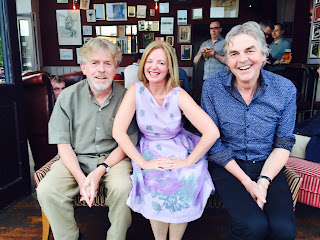To a demonstration of high-end home audio from
Linn.
This is apparently how the new hi-fi dream works. You buy a pair of tall speakers which can be shrouded in appealingly-designed covers to make them look more like furniture than audio equipment and an inscrutable-looking box which houses the streaming unit from which all the music is chosen via an iPad. The idea is you have all the music in the world available via a service like Tidal, you choose what you want and the bidden sound magically manifests itself in the air.
The system sounds great. It's undoubtedly the future, or at least one of the futures, but it's a hereafter which will have to get along without me.
For me music has always been indivisible from stuff. That's not simply because music was the sole channel for my male instinct for acquisition. It's because the whole process of falling in love with music was inextricably bound up with holding it in my hands and this wasn't just for the obvious reasons.
This deep bond between a thing which is intangible and the vessel that traditionally carried it goes beyond simply being able to read the sleeve notes. With a physical product it was clear that you owned it because it sat on your shelf. The physical product sealed and deepened your relationship with the music and the people who made it. With each revolution of the label you absorbed all sorts of ideas about the culture which had produced it.

It wasn't all romance. It was marketing and branding as well. The cover of a twelve-inch long-playing record always managed to persuade you that the music within was rarer and more precious than it actually was. That same music, which was immediately less valuable once on the less charismatic carrier CD, can now be summoned by the stab of a finger on the screen of a tablet and consequently seems to have no value at all.
You can find hundreds of pictures of starlets of the fifties and sixties apparently "relaxing" at home listening to a bunch of gramophone records, strewn across the floor around their recumbent bodies beautiful. That was the dream of good living in those days. Stuff as far as the eye could see.
Today's good life is measured in access to experiences rather than stuff. I understand that. If you were to invest in a Linn system, or something comparable, the amount that it would cost you would say a great deal about the value you attach to the experience of good sound. The problem is that if you attach the same value to your idea of good music (and everybody thinks they know what good music is) you are also going to want to be able to see and touch the physical manifestations of that music.
The future as envisaged by companies like this is a future lacking the very thing that got me at least as excited as I was excited by the music itself - the records it came on.
I went with my friend Brent Hansen, who does have an expensive hi-fi. What Brent does these days is buy the records he wants on expensive vinyl. He then uses the enclosed code to download a digital version to play on his phone. It wouldn't do for everyone. Then again, the future of recorded music is a multi-lane highway. Not everyone will travel the same way.

































